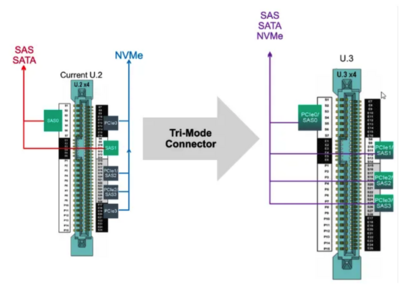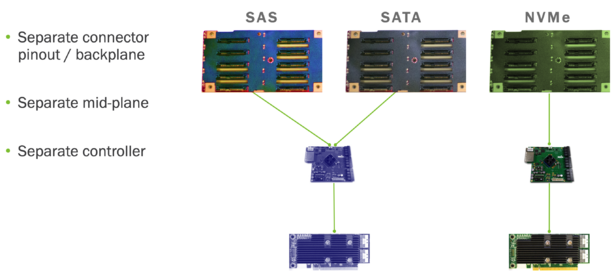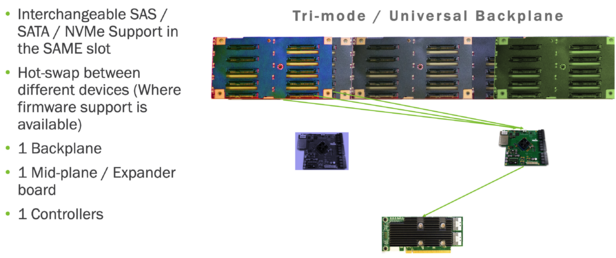Template:Tri-mode: Difference between revisions
| (One intermediate revision by the same user not shown) | |||
| Line 27: | Line 27: | ||
== Storage Today vs Tri-mode == | == Storage Today vs Tri-mode == | ||
Tri-Mode technology brings a wealth of options and flexibility using of SAS devices, Serial ATA (SATA) II and SATA III devices, and PCIe (NVMe) within the same storage infrastructure. | |||
The Tri-Mode controller, for example, Broadcom 9600 Series provides<ref>https://techdocs.broadcom.com/us/en/storage-and-ethernet-connectivity/enterprise-storage-solutions/megaraid8-tri-mode-software/1-0/MR8_Overview/MR_TM_Technology.html</ref> | |||
* SAS Serial SCSI Protocol (SSP), which enables communication with other SAS devices | |||
* SATA III, which enables communication with other SATA II and SATA III devices | |||
* Serial Management Protocol (SMP), which communicates the topology management information directly with an attached SAS expander device | |||
* Serial Tunneling Protocol (STP), which enables communication with a SATA III device through an attached expander | |||
* NVMe, which accesses storage media that is attached by a PCIe bus. Both NVMe SGL and PRP drives are supported. The controller firmware does not use the SGL capabilities of the drives. I/Os are issued based on the PRP format. | |||
[[File:Storage Today & Past.png|center|thumb|612x612px|Storage Today<ref>https://www.opencompute.org/files/OCP-Trimode-Presentation-Final.pdf</ref>]] | [[File:Storage Today & Past.png|center|thumb|612x612px|Storage Today<ref>https://www.opencompute.org/files/OCP-Trimode-Presentation-Final.pdf</ref>]] | ||
[[File:Tri-mode storage.png|center|thumb|616x616px|Tri-mode storage<ref>https://www.opencompute.org/files/OCP-Trimode-Presentation-Final.pdf</ref>]] | [[File:Tri-mode storage.png|center|thumb|616x616px|Tri-mode storage<ref>https://www.opencompute.org/files/OCP-Trimode-Presentation-Final.pdf</ref>]] | ||
Latest revision as of 13:31, 13 June 2024
Tri-Mode

According to OCP-Trimode-Presentation, SAS and NVMe forecasted to increase over the coming years and SATA to decrease.
U.3 is a ‘Tri-mode’ standard, building on the U.2 spec and using the same SFF-8639 connector. It combines SAS, SATA, and NVMe support into a single controller. So, U.3 only requires 1 backplane, 1 mid-plane, and 1 controller, supporting all these drives in the same slot.
Tri-mode controllers alone are not enough, here the disc backplanes also come into play.
For the perfect Tri-Mode operation, system needs to have
• One Backplane
• One connector
• Less high-speed lanes to backplane
• One Mid-plane
• Tri-mode Expander
• One HBA / RAID Controller
Tri-Mode controllers should be PCIe 4.0 and it means that the slot and our disks in the server should be 24G.
On a PCIe 3.0 server, you can use all disk types at the same time with tri-mode controls and U.2 and/or U.3 disk backplane, of course, it will work at PCIe 3.0 and U.2 speed in terms of performance
Storage Today vs Tri-mode
Tri-Mode technology brings a wealth of options and flexibility using of SAS devices, Serial ATA (SATA) II and SATA III devices, and PCIe (NVMe) within the same storage infrastructure.
The Tri-Mode controller, for example, Broadcom 9600 Series provides[2]
- SAS Serial SCSI Protocol (SSP), which enables communication with other SAS devices
- SATA III, which enables communication with other SATA II and SATA III devices
- Serial Management Protocol (SMP), which communicates the topology management information directly with an attached SAS expander device
- Serial Tunneling Protocol (STP), which enables communication with a SATA III device through an attached expander
- NVMe, which accesses storage media that is attached by a PCIe bus. Both NVMe SGL and PRP drives are supported. The controller firmware does not use the SGL capabilities of the drives. I/Os are issued based on the PRP format.


- ↑ https://medium.com/@bilgin.ozturk/what-is-tri-mode-controller-why-is-it-so-important-db97129cc0f5
- ↑ https://techdocs.broadcom.com/us/en/storage-and-ethernet-connectivity/enterprise-storage-solutions/megaraid8-tri-mode-software/1-0/MR8_Overview/MR_TM_Technology.html
- ↑ https://www.opencompute.org/files/OCP-Trimode-Presentation-Final.pdf
- ↑ https://www.opencompute.org/files/OCP-Trimode-Presentation-Final.pdf